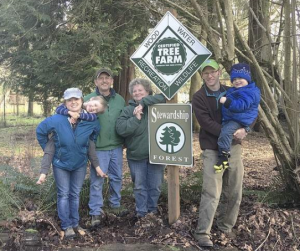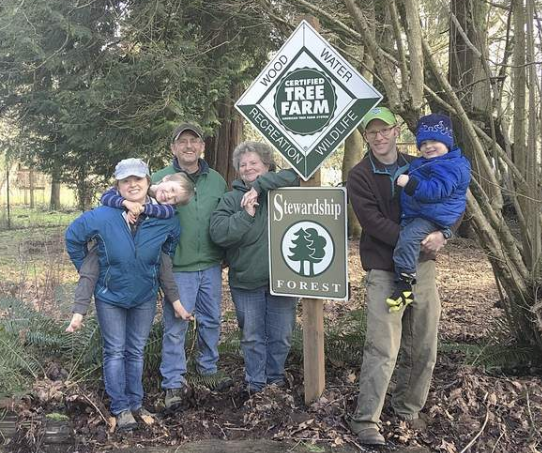FOR IMMEDIATE RELEASE
WASHINGTON, D.C. (December 5, 2019) – Today, the American Tree Farm System awarded the New family of Bellingham, Washington the National Outstanding Tree Farmers of the Year honor from among more than 73,000 certified Tree Farmers nationwide, thanks to their efforts to restore a portion of a critical watershed to help a threatened species in their state.
“The New family embody what it means to make a positive conservation impact on our forests,” said Tom Martin, president and CEO of the American Forest Foundation, the nonprofit conservation organization that oversees the American Tree Farm System. “Owning and caring for forestland in today’s age is not an easy task. A lack of resources, a cumbersome process and the rising costs of forest management are significant barriers that can keep landowners from active forest management. Yet, the New family took on these challenges and were able to restore an important piece of habitat for the threatened salmon species. It was an incredible task, and we commend them for their passion and dedication to conservation.”
David and Dar New are the owners of the Nourse Family Tree Farm, a 165-acre wooded property in Snohomish County, Washington. The property was originally purchased in 1942 by Dar’s grandfather, then passed on to Dar’s uncle who cared for the land for 48 years. When he passed, the property was put on the market. A developer nearly purchased the land, but the recession ended the deal. David, Dar and Dar’s mother, were fortunate to purchase the property in 2010.
While the New family had no formal forestry background or extensive financial resources, they knew that they wanted to care for the land and keep it forested for future generations. They immediately classified the property as Forested Open Space to make the taxes affordable, and hired a forester to help them write a forest management plan.
David joined the Washington Farm Forestry Association and began an extensive journey to learn about sustainable forest management. The property had been idle for many years and needed work, so David laid out activities they would do to help it thrive – a small harvest of over-mature trees and preventing erosion along the roads. Their hard work paid off. In 2015, the News were able to have their land certified by the Washington state Tree Farm Program (watreefarm.org).
One fall, while on a family outing to the property, the News noticed a run of Coho salmon that had ended up stranded in a field. During the 1950s, a tributary to the Pilchuck Creek had been ditched, creating 15 acres of pasture. Over time, the lower section silted in, causing the flow to disappear into the grass. Heavy rain had caused the run of salmon to end up in the field.
Being natives of the Pacific Northwest, the News were familiar with the heritage of the salmon species. Factors like habitat loss, fragmentation, and development had caused the once-legendary salmon runs to dwindle over the years. The species is currently listed as threatened or endangered in nearly three-fourths of Washington State.
The New family decided they wanted to restore the stream, knowing they would need to overcome costs, time and expertise to complete the work.
The News sought out resources to assist them, reaching out to their local conservation district. When at first they did not receive a response, they persisted, following up for almost two years before they formally began working together.
With the Snohomish Conservation District (SCD), the New family created a plan to build a new channel through the pasture field. David leveraged his engineering background to design the channel and the SCD helped the News apply for a Conservation Reserve Enhancement Program (CREP) easement along their stream, to protect the area from development and harvesting, in return giving the News an annual rental fee to help cover forest management costs.
The channel was constructed in August 2016, followed by the planting of 3,000 trees along the 30 acres of stream bank, to help prevent erosion and to help clean and filter the water. The SCD, Washington Conservation Corps crews, community volunteers, and school groups helped to complete the work.
Today, the News are able to walk the stream and watch the salmon navigate through the channel successfully. To help encourage other landowners to take on similar conservation projects, David and Dar have hosted university extension forestry events, tours, and schools and community groups to see their Tree Farm.
Across the U.S., family forest owners like the News, care for the largest portion, more than one-third, of America’s forests. Their efforts are crucial to the sustainability of our country’s natural resources, such as clean water, wildlife habitat, carbon storage and a wood supply for the products Americans use every day.
The American Tree Farm System (ATFS) is an internationally-recognized education and certification program designed specifically for family forest owners. The program provides enrolled landowners with tools, community and support to keep their forests healthy. Enrolled Tree Farmers, in return, care for their land, meeting rigorous Standards of Sustainability. Collectively, there are 19 million forested acres within the ATFS program nationwide.
To be considered for the Outstanding Tree Farmer of the Year award, individuals must exhibit exceptional forest stewardship to protect and improve our forest resources, and must promote forest stewardship within their communities.
The New family was selected from amongst this year’s Regional Outstanding Tree Farmers of the Years, which also included from the South: Stan and Suzanne Wood of Bremen, Alabama; from the Northeast: Bill and Tina Buckel of Bittinger, Maryland; and from the North Central: Mike Trail of Columbia, Missouri.
Contact: Elizabeth Greener; egreener@forestfoundation.org; (202) 253-1096
About Washington Tree Farm Program
The Washington Tree Farm Program is the non-profit organization that delivers Washington’s forestland owners the tools they need to sustainably manage over 400,000 acres of private forestlands across the
